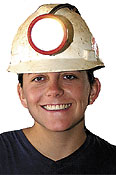By Jessica Lee
Arizona Daily Wildcat
Tuesday October 21, 2003
There is something peaceful about being 150 feet below the surface of the Earth.
Reality echoes in this perfect silence: mining is absolutely necessary.
Having an anti-mining stance is illogical considering that every aspect of society is rooted in materials reaped from the inorganic landscape. Unless you grow your own food and weave your clothes, your life is dependent on geological products.
You know what miners say: "If it can't be grown, it has to be mined."
On Jan. 23, 2001, I wrote a column suggesting that the former Secretary of the Interior, Bruce Babbitt, come back to Arizona to lead the environmental cause here. I mentioned how he "heroically" had taken on the mining industry during his term as secretary. For example, he tried to raise the royalty tax on mining projects. I went so far to suggest he run for President in 2004.
 |
|
Jessica Lee
Associate Editor
|
|
|
Many people reacted strongly to this notion, especially students and faculty in the mining engineering department. Supposedly, Babbitt had raged quite a war against the mining industry during his stint in the Cabinet.
Some people, thinking about a mine, picture a huge hole in the ground with dead vegetation all around. Perhaps toxic fumes are billowing out of the smelter nearby, as a perpetual ominous thunderstorm flares all around. Acid mine run-off is flowing down the hills and people in the nearby town are all sick. A greedy snicker is heard from the CEO's office as he heads the liquidation of rock into money.
Everything about mining is negative, or so I thought.
But not now. I was fortunate enough to visit the University of Arizona San Xavier Mining Laboratory located south of Tucson. The lab was donated to the UA in 1975, and has been used as a hands-on educational facility ever since. Most of the mining engineering students spend a chunk of their Saturdays every week working in the mine.
They must have gotten a kick out of me, the liberal environmentalist, putting on a hard hat and head lamp and climbing down ladders that extended into the Earth.
 |
|
While some do think about the negative aspects of mines, most people neglect thinking about mining altogether.
|
 |
Wooden ladders. Small tunnels. Straight down. Surrounded by rock.
It did not take actually touring a mine to convince me to become more moderate when it came to mining. Rather, it was coming off my environmental white stallion and becoming practical. Resources extracted from the ground are in nearly everything we use or consume.
Jewelry. Cosmetics. Deodorants. Toothpaste. Vitamins. These are just some of the items we use on a daily basis that would not exist without the mining industry. And talk to anyone in the UA mining engineering program and you will learn that mining processes and environmental stewardship have come a long way.
U.S. mining companies now have full-time environmental techs to work with the extraction, processing, manufacturing and reclamation stages to make sure that all environmental laws are being followed. There are mined areas around the country, which, after reclamation, actually look better than the surrounding landscape.
When it comes to educating a new batch of mining engineers, the UA department is a gem. The program, while teaching students the skills necessary to develop and operate mines and other engineering excavations such as subways and sewers, pays special attention to incorporate the environmental side of mining into lectures and course work. "The students have got to see the mining process as more holistic," stressed Hugh Miller, associate mining engineering professor and director of the San Xavier mine lab.
The students confirm being exposed to the environmental factors, from physical to political, caused by the adverse affects of mining. "We are aware of the issues, and if we want to go more in-depth, we can," said David Vatterrodt, mining engineering senior. He is the student Foreman of Mine Operations at the mining lab.
Rather than opposing mining, people should advocate one or both of the following. Support legislation and policy that encourages mines to be environmentally sustainable while remaining profitable or do not buy products that come from mines that are permanently destructive to the ecosystem.
Sure, there are places in the United States where the mining industry has wreaked havoc on the environment, extracted its ore and taken off leaving a nice Super Fund site for the community to deal with. And there are definitely mines in operation in "developing countries" where environmental standards do not exist or are not enforced.
For instance, do you use Johnson & Johnson, Revlon or Avon products? A June 2003 study by the Environmental Investigation Agency and Friends of the Earth found that these U.S. multinationals were buying illegally mined talc products in India sourced by the UK/Dutch cosmetic company, Unilever. The mines are not only destroying essential forest habitat for the Indian tiger, but also polluting watersheds that local people depend on. Can you ethically use these products knowing this?
While some do think about the negative aspects of mines, most people neglect thinking about mining altogether. This is a problem. If people thought about what goes into the items they purchase, perhaps they might not invest in environmentally unethical companies.
We should all appreciate the efforts the UA Department of Mining and Geological Engineering makes to ensure its students ÷ who will represent the mining industry, from the shafts to Wall Street ÷ have a complete understanding of the benefits and costs of mining operations.
Jessica Lee is an environmental science senior. She can be reached at letters@wildcat.arizona.edu.
